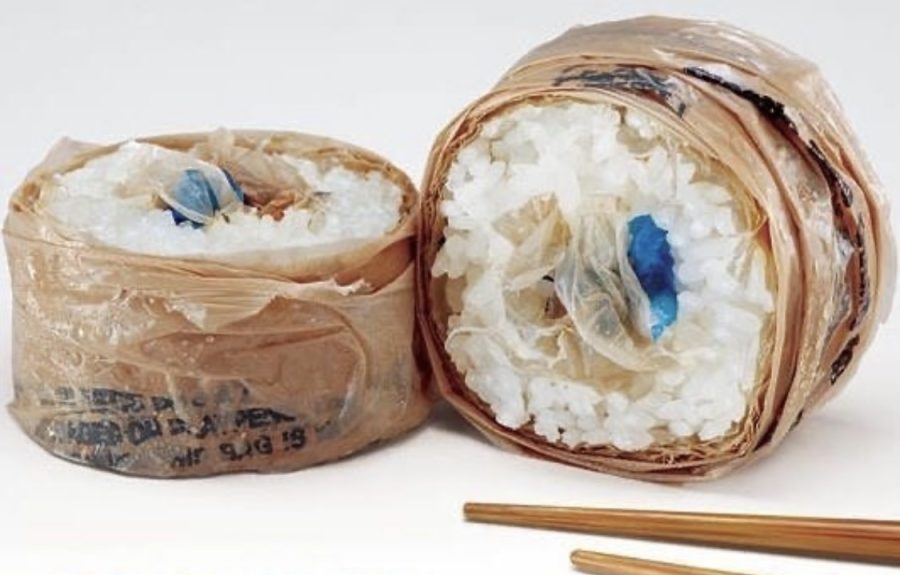Fordham’s Wasteful Habits Must End
I find the waste I observe on campus appalling. A strong impulse to hyper-consume exists in our community which has gone unnoticed because we have grown so accustomed to it. In this way, Fordham is representative of the contemporary Western lifestyle at large, in which the normative tendency is to consume much and produce little.
Though all waste is bad and much of it is unnecessary, plastic waste is especially malign. Consider the life of the plastic lid that is fixed to the top of paper food bowls at at least two dining locations on campus. In this instance, Dagger John’s will be used as an example. Since less than 10% of plastic is recycled regardless of the bin it is discarded into, this journey is likely to comprise the full extent of this product’s use. At a factory somewhere, polyethylene is synthesized, heated and shaped. It is packaged and shipped, presumably to a distributor first, before arriving at Fordham. On campus, it is distributed to whichever dining locations need it — in this case, Dagger John’s. A patron orders a rice bowl from Bonmi, one of the locations within Dagger John’s. The food service employee places a plastic lid onto the bowl and gives it to the patron, who takes their food to the seating area of Dagger John’s, removes the lid and immediately discards it. Not one minute of purposed use before it is cast away into a landfill where it will remain for hundreds of years. This is a comical, Rube Goldberg-esque machination of vast resources to create an absurdly specialized product to ensure that the patron’s food is covered on the walk over from the service counter to their seat. It is perhaps the most invalid need that I can conceive of for a piece of single-use hardware. What great danger does the lid protect the food from? Errant tongues? Outlaws with spoons?
The turn around from manufacture to disregard of this bit of plastic exists on a scale unimaginable to humans just a few generations ago. Now, it is so terribly optimized that the process has degraded to utter flippancy. I propose that we open landfills adjacent to the factories wherein this plastic is synthesized so that new lids can simply be pitched out of a window, averting that pretentious middle-man and saving us all the trouble of feeling obliged to actually use these things that we’ve created. Though the absurdity of this lid makes is my favorite, there are countless other instances of completely unnecessary plastic waste that occurs on our campus and elsewhere: using a drink lid and straw without leaving the restaurant, for example. The use of a drinking straw in almost every case is unnecessary, in fact— to consider the lifting and pitching back of a cup of Coca-Cola an unacceptable exertion. This is indicative of a fallacy that is essential to the industrialized world. One’s slightest whim can be satisfied with a product, but not all problems require solutions.
It is hard to deny that we are poisoning ourselves with this behavior. Microplastic fragments are being discovered in human placentas. The mother’s womb, our most elementary image of benevolent warmth, has been corrupted. I look forward to the day when our children can come individually wrapped! This is an abject perversion of the relationship humans should have with their natural environment. We are not meant to live like this, to lay absolute claim over the earth’s land for the simple need of open space to dump our frivolous refuse. It is impossible to partake in a civilized state without some waste, but I must wonder if plastic straws are necessary to the integrity of our society.
Those who live as consumers will die vacant, never to know the sublimity that they let slip through their fingers because they existed under constant sedation by the perpetual availability of pleasurable distractions and conveniences. A life in which one who is fully abled still takes from this world more than they give is an act of ignorance and weakness. Such a life is a denial of others and is itself a denial of life. I mourn the beauty that the world has been deprived of because of this denial. An intoxication with immediacy has caused countless brilliant people to steal from themselves a life of joy and steal from the world the fruits of their brilliance.
In this sense then, the word “waste” refers both to the material surfeit and the squandering of the opportunity that people who have enough resources for unfettered consumption have to improve their world. The only virtuous function of fortune is to allow people, with the burden of daily subsistence lifted off of them, to spend their time and energy contributing to their communities — to ease the burden of others, to commit themselves to the cultivation of their intellectual or humanitarian gifts. It is therefore an awful tragedy that seemingly, in most cases, the most fortunate are also the most wretched consumers.
I must say that I don’t know what is to be done. It is far too obvious to implore people to change their consumption habits, to ask them if our society is any closer to divinity because of our unbridled creature comforts. But there lies virtue in even the smallest of acts. I urge you, next time you sit down to take your next on-campus meal, spend a moment reflecting on it with gratitude. Think of the countless generations of people who have lived their entire existence not knowing where tomorrow’s meal would come from. Think of what miraculous opportunity you have to do so much when your entire life is not spent struggling to survive. Think of how fortunate you are, and think of the imperative that people of such fortune have to contribute to their world.
John Wenz, FCRH ’26, is undeclared from West Hartford, Conn.










































































































































































































